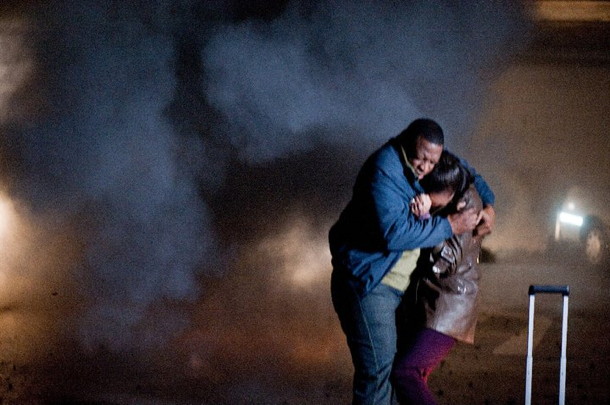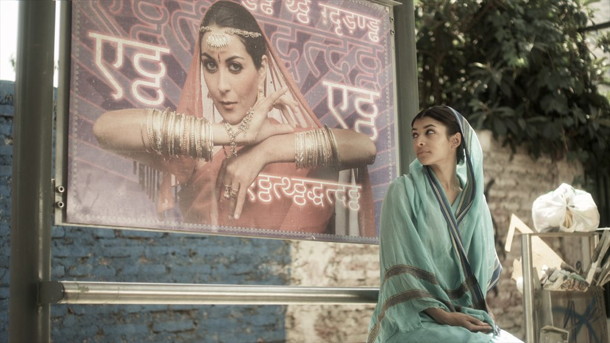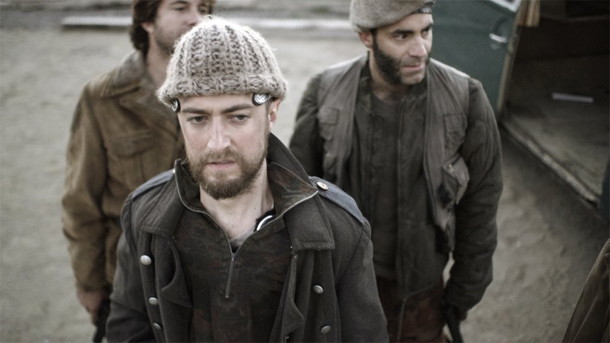Exclusive H+ Interviews
We speak to the people behind the Bryan Singer-produced web series

Think web series are just failed movies cut up into three-minute chunks and shoved online? Think again. Going online today, post-apocalyptic drama H+ was made specifically for the web, and boasts top-notch sci-fi talent including X-Men director Bryan Singer and Buffy ’s Alexis Denisof. It’s set in a future where most of the world have implants that keep them constantly connected to the internet – really useful until a virus is unleashed that wipes out a third of the Earth’s population. We spoke to the show’s creative team to find out what to expect.
First up, producer Jason Taylor…
What was the appeal of H+ ? The web-based medium or the story?
The appeal for any project the story, regardless of the medium, is you want to tell a great story that people can really connect to. I know that doing a digital series Bryan and I wouldn’t have engaged with it if it wasn’t about the story or the characters. To take time away from Jack The Giant Killer and Mockingbird Lane and all the other projects that we’re doing, it had to be something special. We shot it like a feature in terms of how we scheduled and figured things out. It’s probably one of the most laborious feature shoots that any of us have ever been on. But I think it’s the rewarding itch of knowing that the audience is going to love what they see.
Will there be an interactive element to it?
We’re introducing playlists, which is kind of a reorganisation of the episodes that fans can do, and provide the opportunity for other fans to perceive the show the way they want to. It’s really a sharing method that hasn’t been seen before. You miss pieces of the story as it goes out, and we hope that people will question some of the stuff that’s left out and wonder what happened in that space in between . In this realm it really allows the audience to talk about the story – it fosters a community and discussion, and that’s one of the things we’re most excited about.
We’re also on our own YouTube channel, which for a series is a very unique place to be. It’s exciting and it’s captivating because you want to keep your audience and you want to make sure that there’s enough for them to digest. It’s truly the brave new world, and I wouldn’t have thought when we started this project that we’d be where we are today. It’s a game changer.
Why did you choose to put H+ out through YouTube?
YouTube is a great place to put it initially, because it still remains the destination for user content. Sure, the biggest things are the viral videos like “Charlie bit my finger”, and we hope that something like this could have the potential to go viral. Some people have already written that "Bryan Singer’s H+ is the series that could destroy television” or the way that we look at television. It’s very flattering, but the truth is, the content’s going to exist out there whether you have a Smart TV that has a direct outlet to the YouTube channel, or you're watching through a computer.
Turn the page for writer/creator John Cabrera...
Get sneak previews, exclusive competitions and details of special events each month!

Writer and creator John Cabrera…
Do you feel that you’re exploring new territory with H+ ?
I think anybody that’s working in digital media right now can sense that there is a big rumbling happening in Hollywood in general, as a result of all of these new platforms for distribution and for storytelling. So I think it’s hard for anybody working in digital media to not feel like, “Wow, we’re treading new ground.” And that’s both exciting and scary, because if we’re one of the first telling a story like this, it’s a lot of pressure. We want to try to get it right.
The episodes aren’t designed to be viewed in a specific order. Was that challenging from a writing point of view?
We’ve always been really excited and keen on this idea that audiences themselves can be a part of the storytelling, in that they themselves can rearrange the episodes and watch them in different orders and that it wouldn’t effect the enjoyment of the story. And that in some cases, you could actually get some insight into the story that you couldn’t quite get before, because two episodes that were so far from one another, we could bump them up against each other and suddenly we understand how they’re related to one another. Our hope is that since this is going to be on YouTube, our users might actually take it one step further and start to curate the content on their own channels. If you have a YouTube account, you essentially have your own channel, and anybody who subscribes, or any of your friends on YouTube, they’re your audience. You can create playlists of these episodes. Or you could bump them together and make a 45-minute long episode that’s about the length of a network episodic television show.
I mean, is it a web series? I don't know. It’s hard to really define. It sort of looks like a TV show, it has the length of a TV show, but it was created by somebody else, it wasn’t even created by me! It was edited by some user, who felt like that order was relevant and meant something to them.
There’s some production value there too, isn’t there? H+ doesn’t have the traditional look of a web series…
The term “web-series” has a stigma attached to it, because it was created at a time when the only web-series that were being created were being created by people who would have loved to have a television show, but they couldn’t. So they created a web-series instead, on their own dime. And those series look cheap because of it. The truth of the matter is it’s just a series. It’s a series that is told in a different way.
I think that the instinct that people have when they see a beautifully produced web series is that they think it must have been made for television and they just chopped it up and put it online. That’s not what happened, and we’re not going to be the only ones doing this. You’re going to see a lot more of it. The more money that gets poured on to the internet for ads, the higher these budgets are gonna get. And with the cost of making these things going down, as filmmaking tools get cheaper and cheaper and we’re able to create Hollywood-grade effects and picture-looks with cheaper tools, we’re going to start to see this levelling out. We’ll be seeing product that looks exactly like what you would see if you went to a $100 million film.

Star Sean Gunn
Tell us a bit about your role in H+ .
I play Jason O’Brien who, years ago, surfed around the world as a human guinea pig – he would have different injections and go to different medical facilities. Years ago his body was devastated by some of these micro-organisms that were planted inside him. They started to tear his body apart, and he had a bit of a spiritual awakening. He started this neo-Luddite movement, that has a lot of followers out in the woods. So when H+ (the internet implant) kills all those people, Jason and his band of followers who have rejected science become really important. And Jason also has some other strange connections to some nefarious elements.
How would you feel if technology that allowed you to be connected to the internet 24/7 existed?
I’m a little scared of it, but I think I’d probably be like a lot of the people in H+ are, that when enough people do it I’d probably feel safe about it! [Laughs] I don’t think I’d the first to get an H+ implant, but after thousands and then tens of thousands and then hundreds of thousands people have one? I’d say, “Okay, that’s gotta be safe!”
Was the Bryan Singer name a draw for you when you signed up?
Absolutely. Obviously Bryan Singer’s a guy who, if his name is on it, there's going to be an attention to detail. It’s going to be meticulously put together! And it was really Bryan that got the thing made.I think there were a lot of people that thought that it was a really cool idea but it couldn’t be done, and I think that’s what Bryan is good at – looking at something like that and saying, "This is a good idea, and it can be done."
Do you think a show like H+ has a limited shelf life, or could it run indefinitely?
There’s no end to the number of stories that you can generate from H+ . This particular part of the story that we see now stretches a range of about 15 years. But if you wanted to expand the story you can expand it in both directions. You could jump 20 years into the future, and you can could go 20 years into the past, and find compelling components that work within the mythos. That’s tremendously exciting for me. I think that’s the idea of that, that the world goes on indefinitely, just like the real world does. I think people who like storytelling are drawn to that because it gives the world weight.
Richard is a freelancer journalist and editor, and was once a physicist. Rich is the former editor of SFX Magazine, but has since gone freelance, writing for websites and publications including GamesRadar+, SFX, Total Film, and more. He also co-hosts the podcast, Robby the Robot's Waiting, which is focused on sci-fi and fantasy.


